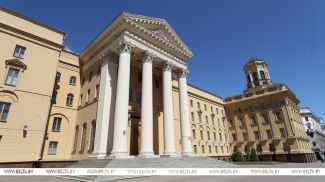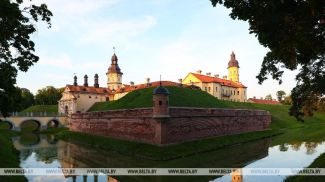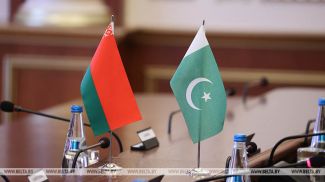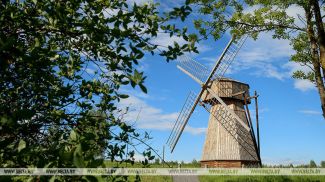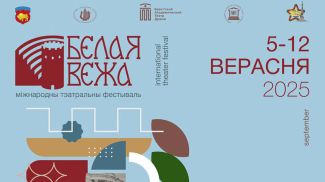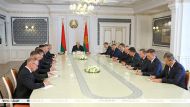They look at me from the screen of the phone with smiling eyes and sigh only sometimes when they recall events of the year 2014. The people I talk to are former citizens of Ukraine, who fled the war to Belarus. Former citizens because Belarus is their new home and new future. We've talked to Ukrainians from various parts of Belarus. Their stories are similar yet so different and will leave no one unmoved. But how did it all start?
In 2014 when a revolution and a coup occurred in Ukraine and were followed by an armed conflict in Donbass, Belarus did not stay away from these events. The republic was actively involved in the organization of the negotiation process and simultaneously started to accept Ukrainian refugees, who were leaving the territories caught in the crossfire in droves.
Back in 2014 Belarus President Aleksandr Lukashenko said: “Thousands of refugees from Ukraine have already come to Russia and Belarus to save their own lives and lives of their children. And we have no right to brush aside these people. We have to help them in a brotherly, neighborly way, especially since these are our people, they are not strangers to us."
Apparently, the Belarusian authorities took a sober look at the situation and realized that it would not be possible to resolve the conflict quickly. Which means that the rapidly rising number of Ukrainians coming to Belarus needed special support measures. This is why the Belarus president signed a decree on 30 August 2014 to support residents of Lugansk Oblast and Donetsk Oblast. It offered a chance to many Ukrainians. A chance to start a new life. A life that has a future.
“You see, we didn't see a future for our children in the first place. The situation that was starting back then... It had been heading for something for eight years. We moved here and we liked everything. We didn't see another option other than to stay here in order to live on, raise children, and work. Simply to live,” Igor Kanziba recalls.
In 2014 he, his wife, and a little child moved to Belarus. Parents of the wife followed them soon after that. The family sold the house in Ukraine and bought housing in Dobrush. Another child was born into the family here.
Igor's mother-in-law Anna Mayor admits: “I want to tell you that it's very good here. We live in Dobrush. It is a very green, nice, cozy town. Beautiful. And most importantly - calm. We are very satisfied. The children work, our grandson Kirill was born here. We are very pleased that we have moved. And of course, it is a far cry from the current situation in Ukraine. When you wake up, you see a peaceful and calm sky. And you want to live and rejoice."
Yekaterina Goncharova was one of the few Ukrainians, who literally boarded the last train in order to get to Belarus. Two weeks after they did the train station where the road of the Goncharovs to Belarus had begun was completely destroyed by bombing. By the way, you can get familiar with their touching story in a special report by BelTA.
Yekaterina now lives in Minsk. She said: “Aleksandr Grigoryevich [Lukashenko] helped us a lot. In absentia one can say. A presidential decree issued in 2014 was the first step that helped us a lot. First, it allowed us to work here with our own education certificates without having to confirm them. Second, we didn't have to pay all the state fees for getting the residence permit. We were also granted free medical care.”
Belarus has become a new home for some because the native country decided to brush aside its citizens. Especially those who happened to be on the other side of the line of fire.
Antonina Obertyukhina recalls: “I lived in the city of Uglegorsk, Donetsk Oblast. The frontline passed right there in late 2014. The city was heavily damaged and the hospital where I worked as an intern right after the university was destroyed. I contacted the Healthcare Ministry for a transfer to another oblast where I could finish my education. They flatly refused to help by saying that since our oblast started the war, I had to deal with the problems on my own.”
The fact that the intern could not produce the necessary documents to Ukrainian officials was the key problem – she would have had to go to a combat zone to fetch them. On the other hand, the situation was not impossible for the Healthcare Ministry to resolve but they decided to stick to their principles. It was strange considering Antonina's education had been funded by the state budget. But soon after that the girl learned about the Belarus president's decree, which promised support to Ukrainians from affected territories, including support with education. She decided to grab the chance and it paid off – she now works as a doctor in Dyatlovo.
In 2014 the Belarusian authorities simplified the procedure for assigning benefits to Ukrainian citizens and granted them the right to get education on equal terms with Belarusians. Textbooks, meals, accommodation in halls of residence… Ukrainians were treated on par with Belarusians, especially the smallest ones.
Denis Zhurakovsky now lives in Zhlobin. He recalls: “During the first year we were simply recovering from this rushed flight from Ukraine. You have to understand that we only grabbed our kids and a couple of suitcases and that's it. Belarus seemed good right away. One can say, our soul rests here. When we arrived, we got help. People showed good will to us. Both the administration and fellow villagers.”
The couple and their kids also found shelter in Belarus. They initially worked in a school in Rogachev District. They moved to Zhlobin some time later. As a large family they got housing on preferential terms.
Denis Zhurakovsky said: “Such housing acquisition benefits are very important... Housing has always been a problem in Ukraine. There are no such programs over there and no such programs are likely to appear.”
The teacher of English Irina Lider now lives in Zhlobin, too. She said: “We used all the benefits and now we use them as a large family. We have three children. Benefits for acquiring textbooks, for paying for textbooks, paying for kindergarten, food at school. We got maternity leave payments. We even received food for one year as a large family: all sorts of canned food, purees. Everything was there. Paid medical care was the only snag. Now we will enjoy it for free as citizens. As for the rest, we felt like genuine citizens of Belarus. When we moved to Zhlobin, we were put on the waiting list for housing. The general line. Then we were put on the waiting list for large families and received an apartment only after a year.”
In 2014 the flow of labor migrants from Ukraine tripled and was close 18,000 people. Add the thousands of people who fled the war zone to that figure. And although officials were worried that the massive flow of Ukrainians would spell trouble for the labor market, the president did not mind healthy competition. "We will welcome everyone who wants to live and work normally," Aleksandr Lukashenko said.
Irina Lider said: “There were no problems with employment. I am an English teacher by education. My mother-in-law went on reconnaissance, so to say, to Belarus before we came into the country. Since teachers are in demand everywhere and primarily in the countryside, we got jobs right away. My husband was a physical education teacher, I was an English teacher. Everyone helped and met us halfway."
Denis Zhurakovsky continues: "We received documents quickly, literally within two weeks, and went to Rogachev District to teach. I had an opportunity to go to Belarus before the final move, and the education department offered us a choice... We had a choice of where we would like to work as teachers. We do not plan to return. We have settled down here. My wife occupies a good position in school, I work as a coach-massage therapist in a hockey club in the extra league. So we have found our place in life."
A special procedure for acquiring Belarusian citizenship was the next step. Since August 2021 more than 5,500 Ukrainians have received Belarusian passports. Presidential decrees were signed frequently.
At a recent government conference in September Belarus President Aleksandr Lukashenko said: “Last August I asked to expedite the granting of citizenship to Ukrainians. For obvious reasons. In general, these are our people. They have made Belarus their home - they observe the laws, raise children, have jobs here, work well in agriculture, education, healthcare and even science. Belarusian passports have already been issued to about 5,000 Ukrainians within a year.”
At the same time, the president decided to address Belarusians as well. In case they worry that national passports are being handed out indiscriminately.
Aleksandr Lukashenko stressed: “I see that some of our citizens of Belarus are concerned about the granting of citizenship and about letting citizens of Ukraine to enter Belarus' territory in general. I want to tell these people that there is no need to worry. We understand and see everything.”
Moreover, getting Belarusian citizenship documents is not a simple step for Ukrainians. Trust me, they had time to weigh everything and think it over.
Antonina Obertyukhina admitted: "I live here, I already have a family here. I thought that I should become a citizen. I'm not going to return, that's for sure. I will stay here, live and work. Yes, I miss my parents very much, but I will definitely not return."
The Goncharovs have also been granted Belarusian citizenship: “We were glad to become citizens of Belarus. Because for us it is essentially... For me it is essentially native land because my father came from Belarus. We never felt disadvantaged here. It is probably the only CIS state where one can rest assured about their kids. Security here is top-notch.”
Denis Zhurakovsky's family has also decided to stay in Belarus: “We simply decided to stay here to live, which means we need to change citizenship since such an opportunity is available. We need to anchor ourselves with the citizen status. And in the future it will probably be easier for the children to get a decent education, get a job and not tangle with the bureaucratic machine of Ukraine, which is very complex and confusing. By and large, it is designed to complicate the life of citizens as much as possible.”
With the passage of time the situation in Donbas did not exactly get normal but became routine. Both the locals and the world community grew accustomed to the sometimes blazing and sometimes smoldering conflict. It is hard to imagine but living in such conditions slowly became normal for the people.
The flow of migrants from Ukraine predictably began to decline, but Ukrainians still needed support. The president started receiving requests to accept children from Donbass for rehabilitation. And the head of state did more than supporting this initiative: Belarus started regularly inviting Donbass children to come over.
The Paralympian and public figure Aliaksei Talai initially passed a request from Donetsk public organizations to Aleksandr Lukashenko.
Aliaksei Talai told us: “I requested support from him. After getting it we managed to organize the arrival of children with disabilities first. We tried to keep it quiet. We were very concerned about security. And the wave keeps getting bigger now. The second group of children arrived this autumn a short time ago – 350 children as well as accompanying persons.”
An educational process was organized for children from Donbass in addition to recreation and health improvement. Excursions and cultural events awaited them in Belarus.
As soon as they got out of the train, the kids interrupted each other to say: “I'd like to swim as soon as possible because there is no water in Donetsk due to shelling. Everyone looks forward to the swimming pool! We'd like to go to the zoo! I look forward to being taken to some place in the city and being shown something interesting. I looked at the maps. There is a palace of arts here. I'd like us to be taken there.”
Some of the children came from Mariupol. Combat operations took place there a short while ago.
Aliaksei Talai said: “They had been taken out of basements and other places. They had been starving. They had lived in cold. They would stay indoors for days. Now today they tell us: ‘We want to have fun! We want a disco party in the camp!' And one's soul rejoices. The children are getting livelier!”
This year the war has turned the life of Ukraine upside down and ordinary people once again needed protection. A flood of refugees went to Belarus again. This time from all over Ukraine.
Aleksei Begun, Chief of the Citizenship and Migration Department of the Internal Affairs Ministry, said: “A new wave of incoming Ukrainians emerged when Russia launched the special military operation in Ukraine. Over 55,000 citizens of Ukraine have come to Belarus since 24 February. The Internal Affairs Ministry has processed over 5,800 requests for acquiring Belarusian citizenship. 4,900 requests were approved and the Ukrainians became Belarusian citizens.”
In September Aleksandr Lukashenko updated the decree initially signed in 2014 in order to support Ukrainians in a difficult life situation. They were given the right to receive preschool education, general education, vocational training and higher education at the expense of the state budget or for a fee on par with Belarusians.
Has the matter of children benefits and pensions been resolved? Now Ukrainians do not need to provide documents confirming the termination of these payments in Ukraine. Prior to the adoption of the presidential decree Belarus could grant the benefits and pensions only if these documents were available. It is clear that at present this is objectively impossible. Pensions will be paid to Ukrainians according to the same standards and on the same terms as pensions are paid to Belarusians. For inquiries they have to contact a local labor, employment, and social services office at the place of registration. Child allowances will also be assigned according to state standards. Ukrainians have to have either a temporary residence permit or a residence permit.
Citizens of Ukraine have also been exempted from paying a variety of state duties. Life of Belarusian employers, who hire Ukrainians, has been simplified as well.
Everyone should remember the words Aleksandr Lukashenko said in Pruzhany District:
"Ukrainians come to us and we give them citizenship without delay. Most of them work so hard! And they are glad. Why? Because they have experienced grief and have endured a war. And these are our people. We should not offend them."
Regretfully, times are hard today. For everyone. It is difficult for us to predict what will happen tomorrow, let alone plan for years to come. But all the Ukrainians we've been able to talk to feel positive: even in their day-to-day existence they are confident in their future and the future of their children. You know it yourself that it means a lot.
“I was glad to hear that several days ago this decree was repeated not only for residents of Donetsk Oblast and Lugansk Oblast but for all Ukrainians who are now forced to flee. It means a lot because people don't want to be refugees. They simply want to work calmly, live and know that tomorrow they will have peaceful sky above their heads. It is the most important thing,” Yekaterina Goncharova is convinced.
Belarus is always ready to lend a shoulder to Ukrainians as well as to other neighbors and nations. But I will say something that may seem inappropriate for some. I would like this decree to expire as soon as possible. For just one reason: Ukraine and Ukrainians must have their own future. A future that does not require the signing of such documents.
The project has been created using the target fee for the production of national content.




